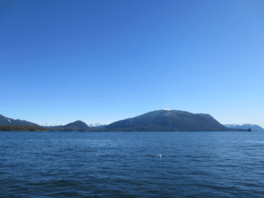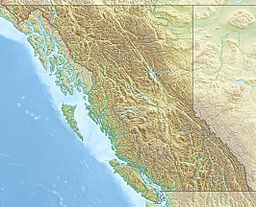Flora Bank facts for kids
Quick facts for kids Flora Bank |
|
|---|---|

Looking southward over the Flora Bank
|
|
| Coordinates | 54°11′N 130°18′W / 54.183°N 130.300°W |
Flora Bank is a special shallow area of water, also known as a bank. It is located in British Columbia, Canada. You can find it at the edge of Chatham Sound, between Lelu and Kitson Islands. It sits at the north entrance to Inverness Passage, just south of Prince Rupert. The bank was named after Miss Flora MacDonald, whose father managed a local fish cannery.
Contents
Why Flora Bank is Important
Flora Bank is a very important place for many plants and animals. It has one of the biggest areas of eelgrass in British Columbia. Eelgrass looks like green ribbons growing underwater. It creates a safe home for lots of sea creatures.
Home for Waterfowl
Experts from the North Coast Wetlands Program have studied Flora Bank. They found that it is a key spot for birds that migrate or spend the winter there. Many different kinds of waterfowl, like ducks and geese, use this area to rest and find food.
Nursery for Young Salmon
The Canadian Department of Fisheries and Oceans says Flora Bank is vital for young Skeena River salmon. Baby salmon, including chum, chinook, and pink salmon, spend their early lives here. They hide and grow in the shallow eelgrass beds and sheltered areas. This helps them get strong before they head out to the open ocean. It is also an important place for eulachon, which are small, oily fish.
Food for Small Creatures
Flora Bank is a critical habitat for young animals that feed on tiny creatures living on the seafloor. These are called epibenthic feeder species. The rich environment provides plenty of food for these growing animals.
How Flora Bank Formed
The ground under Flora Bank is made of sediments. These sediments are very old, about 8,000 years old! They were left behind by glaciers from a long time ago. Scientists are still studying exactly how the bank stays in place and why its sediments don't wash away.
 | Tommie Smith |
 | Simone Manuel |
 | Shani Davis |
 | Simone Biles |
 | Alice Coachman |


